The Ultimate Guide to Master CRM for Startups in 2024!
Did you know that startups using CRM see an average 29% increase in sales 403? (according to salesforce) That’s right!
In today’s fast-paced business world, Customer Relationship Management (CRM) software isn’t just a luxury – it’s a necessity for startups looking to scale. But with so many options out there, how do you choose the right one? Don’t worry, we’ve got you covered!
pleIn this guide, we’ll explore the best CRM for startups in 2024, helping you make an informed decision that could revolutionize your business operations and I will tell you in my experience what were the things that we did wrong. If you want more details on how to implement your CRM you can check our CRM Implementation Guide.
Let’s dive in!
Table of Contents
Why Startups Need a CRM?
Streamline customer interactions and data management
First of all, imagine transforming your chaotic customer data into a streamlined, easily accessible goldmine of information. That’s exactly what CRM does for startups. It acts as a central hub, capturing every customer interaction, from that first curious email to the moment they become a loyal client!
No more shuffling through endless spreadsheets or desperately searching for that crucial client note you scribbled down last week. With a CRM, you’ll have a 360-degree view of your customers at your fingertips, allowing you to provide personalized service that suites their needs.
Improve sales processes and lead nurturing
Say goodbye to leads slipping through the cracks!
CRM software supercharges your sales processes, turning your team into a lead-nurturing powerhouse. It automatically tracks where each prospect is in your sales funnel, triggering timely follow-ups and personalized communications. Watch as your conversion rates soar and your sales cycle shortens.
With a CRM, you’re not just selling – you’re building relationships that turn prospects into loyal customers and brand ambassadors.
Enhance team collaboration and communication
Break down those departmental silos and get your team working together like a well-oiled machine. CRM software acts as a central nervous system for your startup, ensuring everyone’s on the same page.
From sales and marketing to customer support, each team member can access real-time customer data, share insights, and collaborate effortlessly. No more miscommunications or dropped balls – just seamless teamwork that drives your startup forward.
Provide valuable insights for data-driven decision making
Harness the power of data to propel your startup to new heights. A CRM software doesn’t just store information – it transforms raw data into actionable insights. Uncover trends in customer behavior, identify your most profitable customer segments, and spot opportunities for upselling or cross-selling. With these powerful analytics at your fingertips, you’ll make informed decisions that give you a competitive edge in the market
Scale operations efficiently as the startup grows
Unlike static systems that buckle under the pressure of expansion, a good CRM solution scales effortlessly. Whether you’re adding new team members, expanding into new markets, or diversifying your product line, your CRM adapts to support your evolving needs. It’s like having a business partner that’s always one step ahead, ensuring your operations remain smooth and efficient no matter how fast you grow.
So…, what are we looking when we are just starting our business or we want to scale it…?
Here is a criterion I use to evaluate each platform:
Top Features to Look for a CRM for Startups
User-friendly interface and ease of adoption
The best CRMs offer clean layouts, logical workflows, and helpful tooltips that guide users through features
Customization options to fit unique startup needs
The right CRM should mold to fit your startup like a glove, whether you need to track unconventional customer data points or set up industry-specific sales stages.
Integration capabilities with other essential tools
Seek out CRMs that offer seamless integrations with the tools you already rely on – be it your email marketing platform, accounting software, or project management system.
Mobile accessibility for on-the-go management
Your sales team should be able to update deal information right after a client meeting, or your support staff should be able to access customer history while on a call – all from their smartphones or tablets.
Scalability to accommodate future growth
This means looking for CRMs that can handle increasing data volumes, growing user bases, and evolving feature requirements without missing a beat.
Affordable pricing plans suitable for startup budgets
Let’s face it – as a startup, every dollar counts. But that doesn’t mean you have to sacrifice quality when it comes to your CRM. Look for solutions that offer tiered pricing plans, allowing you to start with essential features and scale up as your needs (and budget) grow.
So taking that in consideration, here are my top!
The Best CRM Software for Startups in 2024
HubSpot CRM: Free option with powerful features
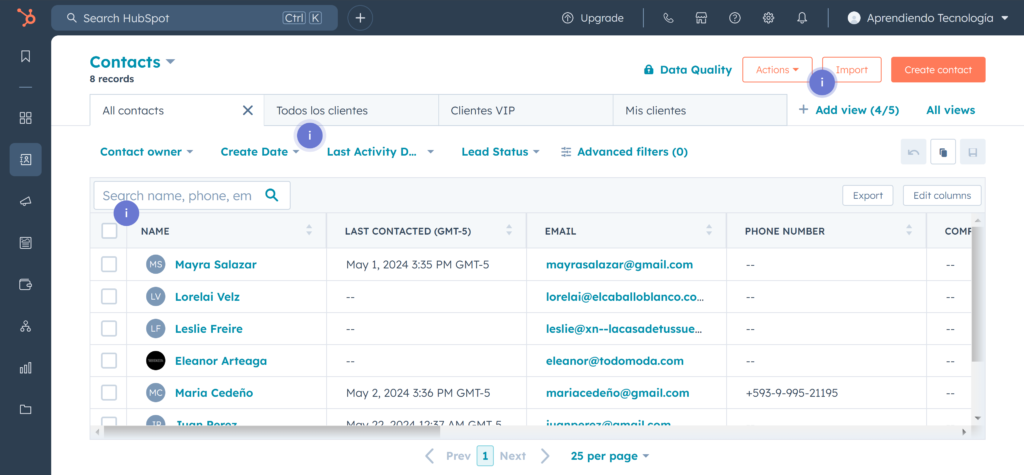
HubSpot CRM is the Swiss Army knife of the startup world!
It offers a robust free plan that punches well above its weight class. It’s like finding a secret weapon in your entrepreneurial arsenal! This powerhouse solution provides a comprehensive suite of tools, from contact management to deal tracking, all wrapped up in an intuitive interface that’ll have your team up and running in no time.
But don’t let the “free” tag fool you – HubSpot delivers enterprise-grade features that grow with your startup. As you scale, you can seamlessly upgrade to paid tiers, unlocking advanced automation, reporting, and customer service tools. With HubSpot, you’re not just adopting a CRM; you’re future-proofing your startup’s growth.
Key Features:
- Contact and company insights
- Deal tracking and pipeline management
- Email tracking and notifications
- Meeting scheduling
- Live chat and chatbots
- Reporting dashboard
- Gmail and Outlook integration
User Quotes:
“HubSpot CRM has transformed our sales process. It’s intuitive and packed with features we didn’t even know we needed!” – Sarah J., Startup Founder
“The free plan is incredibly generous. It’s perfect for startups looking to get their feet wet with CRM.” – Mike T., Sales Manager
Pricing:
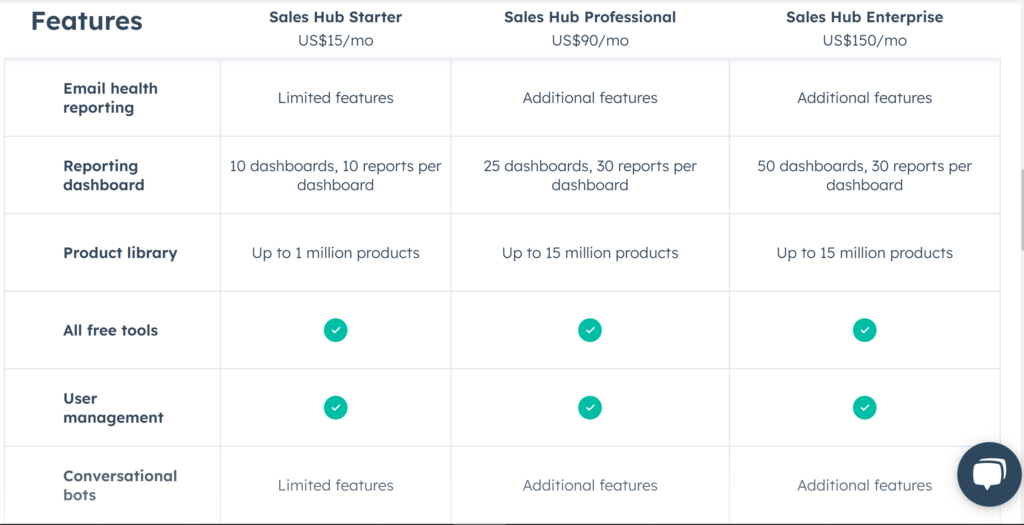
There are a lot of combinations and bundles when choosing a hubspot plan because of their vast number or products but here are the ones relevant to the sales team
- Free: $0/user/month
- Starter: $15/user/month
- Professional: $90/user/month
- Enterprise: $150/user/month
What I like/dislike about:
Like:
- Free forever plan available
- User-friendly interface
- Robust marketing tools
- Excellent customer support
- Great learning academy
Dislike:
- Limited customization in free plan
- Advanced features require paid upgrades
- Can be overwhelming for small teams
- Some features have a steep learning curve
Product Updates
- Enhanced AI capabilities for content creation and optimization
- Improved reporting features with custom report builder
- New integration with LinkedIn Sales Navigator
Salesforce Essentials: Robust solution from a market leader
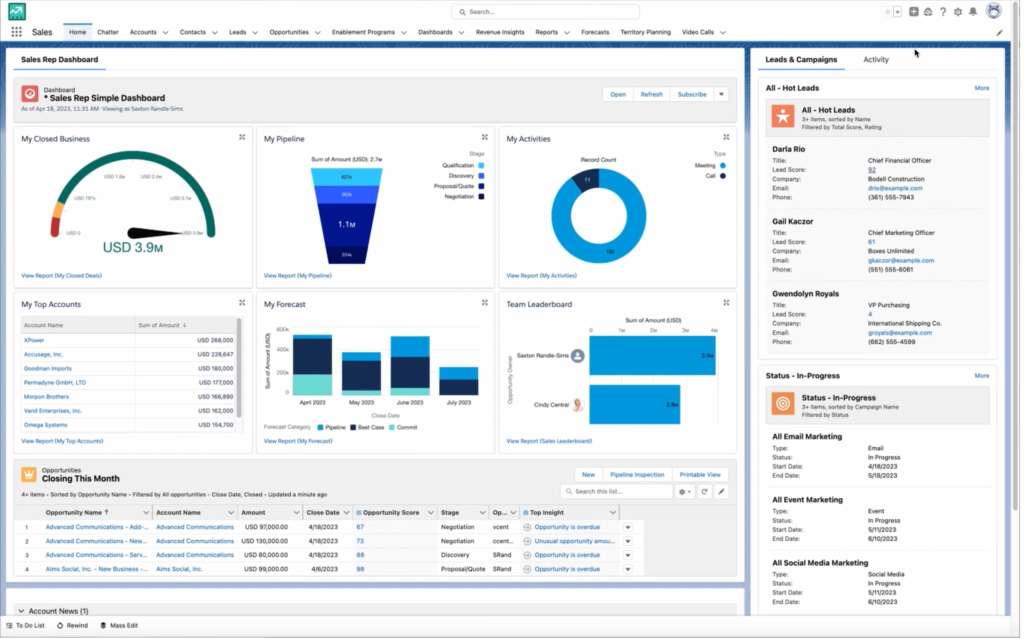
When it comes to CRM, Salesforce is the 800-pound gorilla in the room – and Salesforce Essentials brings that enterprise-level power to startups in a neatly packaged, affordable solution.
It’s like having a Fortune 500 company’s tools tailored for your startup garage. Essentials offers a streamlined version of Salesforce’s legendary platform, focusing on out-of-the-box functionality that gets you up and running quickly.
You’ll benefit from best-in-class contact management, opportunity tracking, and customizable reports. Plus, as your startup rockets to success, you can easily scale up to Salesforce’s more advanced offerings.
With Essentials, you’re not just choosing a CRM; you’re laying the groundwork for long-term success.
Key Features:
- Lead and opportunity management
- Customizable sales process
- Email integration
- Mobile app with offline capabilities
- Task management and reminders
- Customizable reporting and dashboards
- Einstein AI for predictive analytics
User Quotes:
“Salesforce Essentials gives us enterprise-level tools at a startup-friendly price. It’s been crucial to our growth.” – Alex R., CEO
“The customization options are unparalleled, but it took us some time to fully leverage them.” – Lisa M., Sales Director
Pricing:
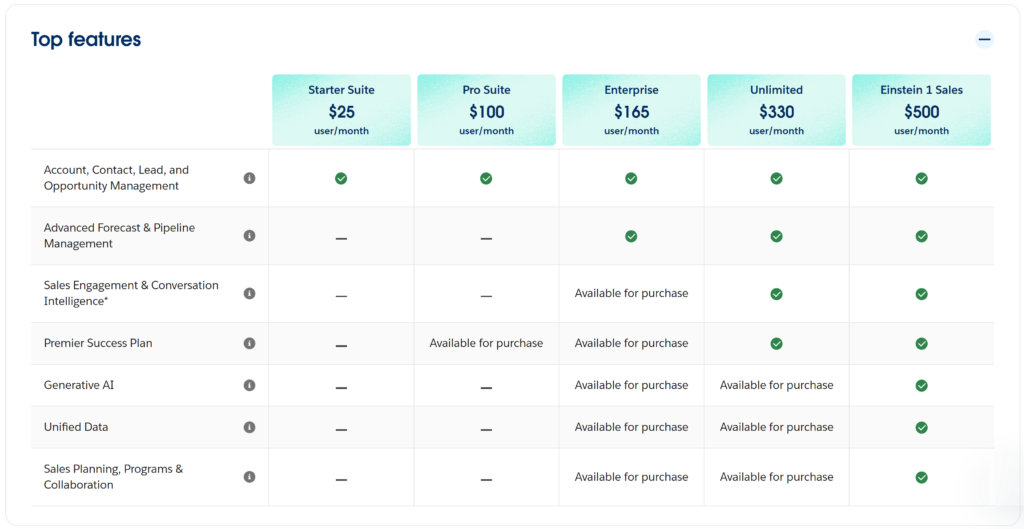
- Starter Suite: $25/user/month (up to 10 users)
- Pro Suite: $100/user/month
- Enterprise: $165/user/month
- Unlimited: $330/user/month
- Einstein 1 Sales: $500/user/month
What I like/dislike about:
Like:
- Powerful and highly customizable
- Scalable for growing businesses
- Extensive third-party integrations
- Strong analytics and reporting
Dislike:
- Steeper learning curve
- Can be expensive as you scale
- Overwhelming for small teams
- Requires dedicated admin for full utilization
Product Updates
- Enhanced mobile experience with improved offline capabilities
- New AI-powered opportunity scoring
- Improved integration with Microsoft Teams
Pipedrive: Sales-focused CRM with intuitive interface
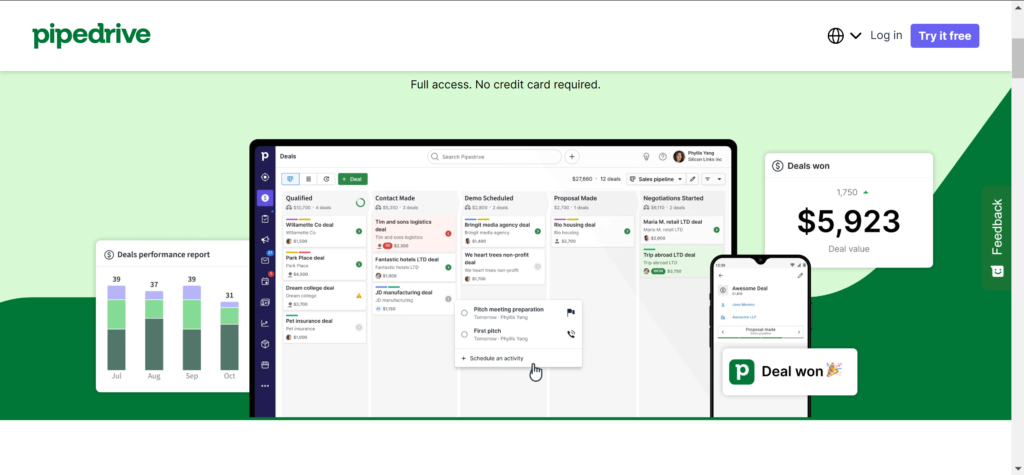
This is the first CRM I used and really loved it! If closing deals is the lifeblood of your startup, Pipedrive is about to become your new best friend. This sales-centric CRM is like having a top-tier sales coach embedded in your software.
Pipedrive’s visual pipeline makes it a breeze to track and manage deals, ensuring no opportunity slips through the cracks. Its intuitive interface is a joy to use, meaning your sales team will actually want to keep it updated (a minor miracle in the world of CRM adoption).
With features like email integration, activity reminders, and customizable fields, Pipedrive streamlines your sales process from lead to close.
For startups that live and die by their sales performance, Pipedrive offers the focused, user-friendly solution you’ve been dreaming of.
Key Features:
- Visual sales pipeline
- Email integration and tracking
- AI-powered sales assistant
- Customizable fields and processes
- Mobile app with full functionality
- Goal setting and tracking
- Integrated scheduling tool
User Quotes:
“Pipedrive’s visual pipeline makes it incredibly easy to manage our sales process. It’s a game-changer.” – Tom K., Sales Manager
“The simplicity is its strength. Our team was up and running in no time.” – Emma S., Startup Co-founder
Pricing:
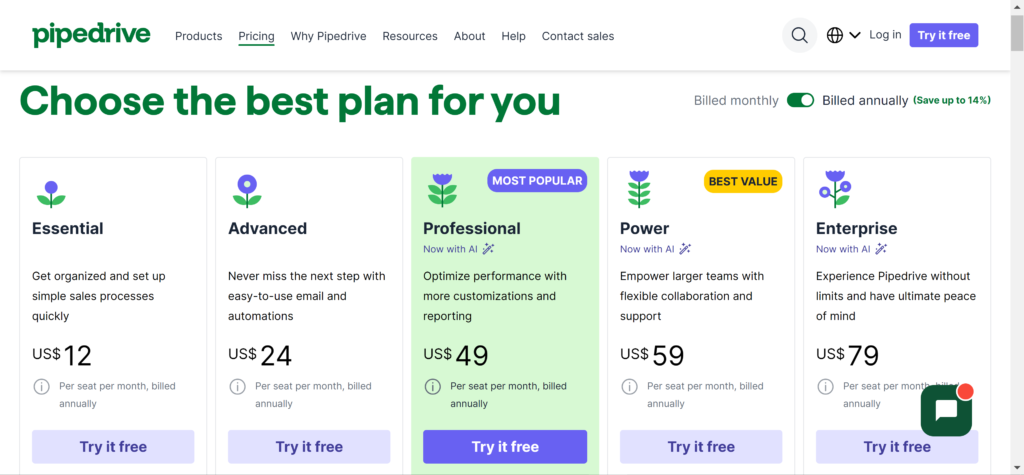
- Essential: $12/user/month
- Advanced: $24/user/month
- Professional: $49/user/month
- Power: $59/user/month
- Enterprise: $79/user/month
What I like/dislike about:
Like:
- Intuitive, visually appealing interface
- Excellent for managing sales pipelines
- Good value for money
- Easy to set up and use
Dislike:
- Limited marketing automation features
- Reporting could be more robust
- Less suitable for non-sales focused teams
- Limited customization in lower tiers
Product Updates
- Enhanced AI capabilities for lead scoring and deal insights
- New Campaigns feature for managing marketing efforts
- Improved mobile app with better offline functionality
Zoho CRM: Versatile and customizable platform
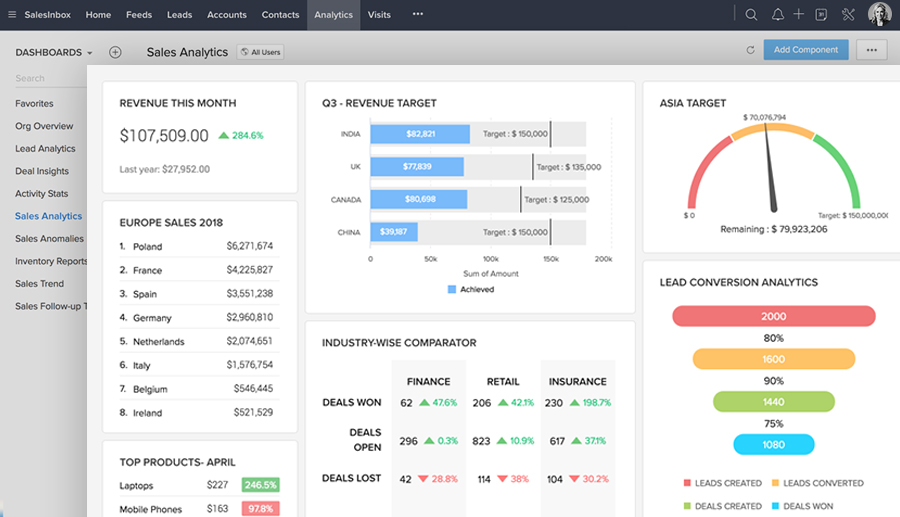
Zoho CRM is the chameleon of the CRM world, adapting to fit your startup’s unique needs like a second skin. This versatile platform offers a treasure trove of customization options, allowing you to mold the CRM to your specific workflows and processes.
But don’t let its flexibility fool you – Zoho comes packed with powerful out-of-the-box features for sales, marketing, and customer support. What really sets Zoho apart is its seamless integration with the broader Zoho ecosystem of business tools. From project management to invoicing, Zoho offers a one-stop-shop for all your startup’s needs. For founders looking for a CRM that can grow and evolve with their business, Zoho CRM is a compelling choice that punches well above its weight class.
Key Features:
- Lead and contact management
- Workflow automation
- Social media integration
- AI-powered assistant (Zia)
- Customizable modules and fields
- Advanced analytics and reporting
- Multi-channel customer support
User Quotes:
“Zoho CRM’s customization options are unmatched. It adapts perfectly to our unique processes.” – David L., Operations Manager
“The integration with other Zoho apps makes it a powerful all-in-one solution for our startup.” – Rachel F., Marketing Director
Pricing:
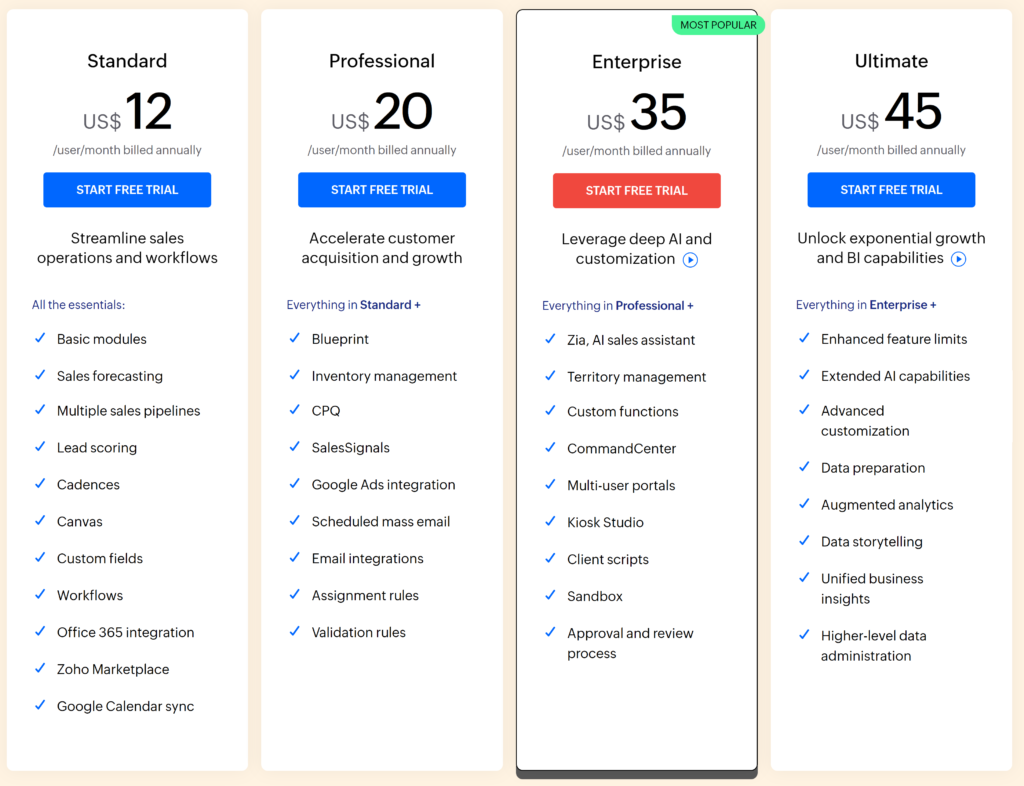
- Standard: $12/user/month
- Professional: $20/user/month
- Enterprise: $35/user/month
- Ultimate: $45/user/month
What I like/dislike about:
Like:
- Highly customizable
- Affordable pricing
- Part of a larger suite of business tools
- Strong automation capabilities
Dislike:
- Can be complex to set up initially
- Some features only available in higher tiers
- User interface could be more intuitive
- Customer support can be slow at times
Product Updates
- New Canvas design tool for creating custom CRM views
- Enhanced AI capabilities with Zia Voice
- Improved integration with Microsoft 365
Freshsales: AI-powered CRM for modern startups
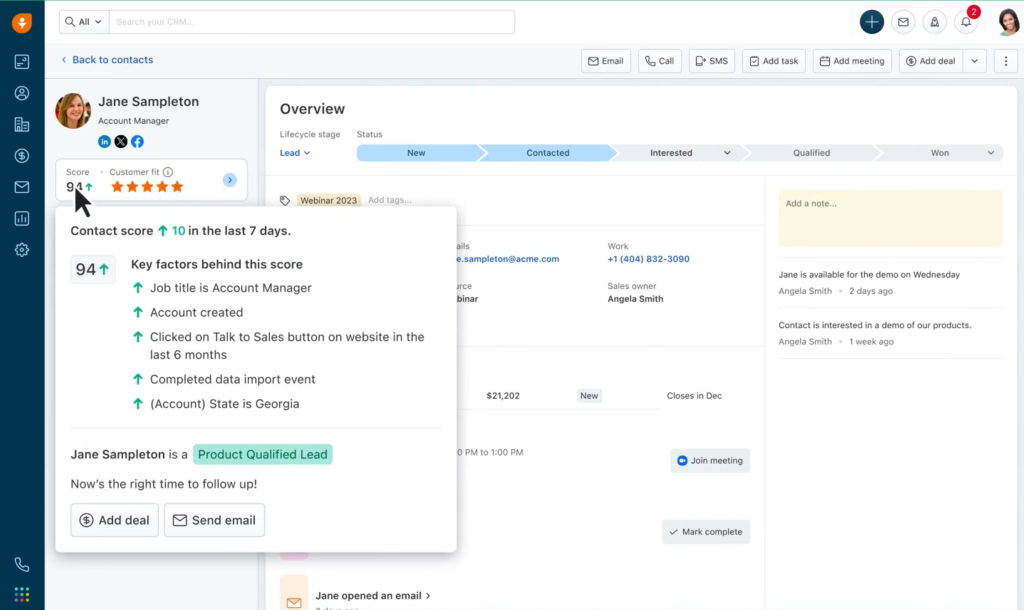
Step into the future of customer relationship management with Freshsales, the AI-powered CRM that’s tailor-made for forward-thinking startups. It’s like having a crystal ball for your customer interactions!
Freshsales leverages artificial intelligence to provide predictive contact scoring, identifying your hottest leads and most promising opportunities. The AI assistant, Freddy, offers intelligent workflow automations and insightful forecasts, freeing up your team to focus on what really matters – building relationships and closing deals. With its clean, modern interface and robust mobile app, Freshsales is perfect for startups that want to stay ahead of the curve.
If you’re ready to harness the power of AI to supercharge your customer relationships, Freshsales might just be your perfect match.
Key Features:
- AI-powered lead scoring
- Built-in phone and email
- Visual deal pipeline
- Customizable reports and dashboards
- Workflow automation
- Mobile app with offline access
- Website visitor tracking
User Quotes:
“Freshsales’ AI features have dramatically improved our lead prioritization. It’s like having a digital sales assistant.” – Mark W., Sales Director
“The interface is so intuitive, our entire team was productive from day one.” – Sophia R., Startup Founder
Pricing:
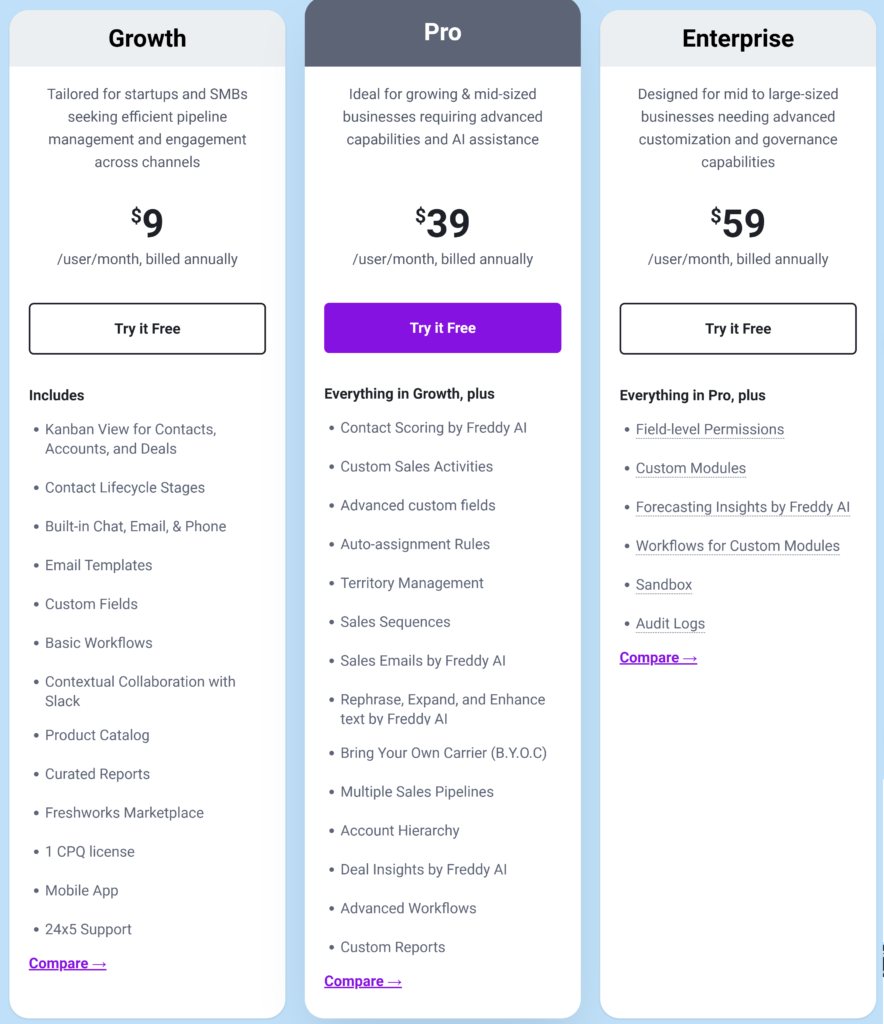
- Growth: $9/user/month
- Pro: $39/user/month
- Enterprise: $59/user/month
What I like/dislike about:
Like:
- AI-powered features
- User-friendly interface
- Excellent customer support
- Good value for money
Dislike:
- Limited third-party integrations
- Some advanced features only in higher tiers
- Reporting could be more comprehensive
- Limited customization in lower tiers
Product Updates
- New AI-powered deal insights for better forecasting
- Enhanced customization options for sales processes
- Improved integration with Freshmarketer for aligned sales and marketing efforts
How to Choose the Right CRM for Your Startup
Assess your specific business needs and goals
Choosing the right CRM starts with a deep dive into your startup’s DNA. It’s time to put on your detective hat and uncover the unique needs that make your business tick. Are you a sales-driven machine, constantly on the hunt for new leads? Or perhaps you’re all about nurturing long-term customer relationships? Maybe your focus is on providing top-notch support to a loyal user base?
Grab a whiteboard and map out your core processes, pain points, and aspirations. Don’t just think about where you are now – envision where you want to be in six months, a year, or even five years down the road.
This exercise will be your North Star, guiding you towards a CRM that not only meets your current needs but can also scale and adapt as your startup evolves.
Consider your team’s technical expertise and learning curve
Let’s face it – even the most powerful CRM in the world is useless if your team can’t (or won’t) use it. Take a honest look at your team’s tech-savviness. Are they digital natives who can pick up new tools in a heartbeat, or do they break out in a cold sweat at the mention of new software?
The ideal CRM should strike a balance between powerful features and user-friendliness. Consider solutions that offer intuitive interfaces, comprehensive training resources, and responsive customer support.
Remember, a shorter learning curve means faster adoption and quicker returns on your investment. Don’t be afraid to involve your team in the selection process – after all, they’re the ones who’ll be using the CRM day in and day out.
Evaluate integration requirements with existing tools
In today’s interconnected business world, your CRM can’t exist in a vacuum. It needs to play nice with the other tools in your startup’s tech stack.
Take inventory of the software you’re currently using – email platforms, marketing automation tools, accounting systems, project management software, and so on. Look for CRMs that offer seamless integrations with these essential cogs in your startup machine.
The goal is to create a smooth flow of data across your entire operation, eliminating silos and boosting efficiency. Pay attention to whether the CRM offers pre-built integrations, an open API for custom connections, or if you’ll need to rely on third-party integration tools.
The right integrations can transform your CRM from a standalone tool into the central nervous system of your entire operation.
Compare pricing plans and long-term costs
As a startup, every dollar counts, so it’s crucial to dive deep into the pricing structures of potential CRM solutions. But don’t just look at the sticker price – consider the total cost of ownership.
Start by comparing the features offered in different pricing tiers. Will the basic plan meet your needs, or will you need to spring for a more expensive option to get that must-have feature? Look out for hidden costs like per-user fees, storage limits, or charges for customer support.
Also, consider the scalability of pricing – how will the costs change as your team grows or as you need more advanced features? Don’t forget to factor in potential savings from increased efficiency and improved customer retention.
The right CRM should offer a clear return on investment, helping your startup grow without breaking the bank.
Read user reviews and request demos before committing
Before you take the plunge, it’s time to do some serious reconnaissance. Dive into user reviews from other startups in your industry. What do they love about their CRM? What frustrations do they have?
Look for patterns in the feedback – they can reveal a lot about a CRM’s strengths and weaknesses. But don’t stop there – reach out to your network and ask for firsthand experiences. Nothing beats real-world insights from people you trust. Once you’ve narrowed down your options, it’s demo time!
Most CRM providers offer free trials or guided demos. Take advantage of these opportunities to kick the tires and see how the CRM feels in action. Get your team involved in the testing process – their buy-in is crucial for successful adoption.
Remember, choosing a CRM is like picking a business partner. Take your time, do your homework, and make sure it’s a good fit before you commit.
Implementing a CRM in Your Startup
Develop a clear implementation strategy
Implementing a CRM isn’t just about flipping a switch – it’s about orchestrating a symphony of technology, processes, and people. Start by crafting a rock-solid implementation strategy that will be your roadmap to CRM success.
Assemble a dream team of stakeholders from across your startup, each bringing their unique perspective to the table. Together, outline clear goals and milestones for your CRM rollout.
Are you aiming to boost sales efficiency by 20% in the first quarter?
Or perhaps you want to reduce customer churn by 15% within six months?
Whatever your objectives, make them SMART: Specific, Measurable, Achievable, Relevant, and Time-bound. Break down your implementation into manageable phases, each with its own timeline and responsible parties.
Don’t forget to build in buffer time for unexpected hiccups – because let’s face it, in the startup world, curveballs are the norm!
Ensure proper data migration and setup
Data is the lifeblood of your CRM, so treat your data migration with the reverence it deserves.
This is your golden opportunity to clean house and ensure you’re starting your CRM journey on the right foot. Begin by auditing your existing data sources – spreadsheets, email contacts, old databases – and determine what’s essential to bring over to your shiny new CRM.
It’s time to be ruthless: ditch outdated contacts, merge duplicates, and standardize data formats. If it doesn’t spark joy (or provide value), let it go! Work closely with your CRM provider or a data migration specialist to map your old data to the new system’s fields.
Run test migrations to catch any gremlins in the works before going live. Remember, a clean, well-organized database is the foundation for CRM success, so invest the time to get it right from the start.
Provide comprehensive training for your team
Your CRM is only as good as the people using it, so it’s time to transform your team into CRM superheroes!
Develop a comprehensive training program that goes beyond just clicking buttons – help your team understand the ‘why’ behind the ‘how’. Show them how the CRM will make their lives easier and contribute to the company’s success.
Consider different learning styles: offer a mix of hands-on workshops, video tutorials, and written guides. Don’t dump all the information on them at once – break it down into digestible chunks and allow time for practice and questions.
Identify CRM champions within each department who can provide ongoing support and keep the enthusiasm alive.
Remember, training isn’t a one-and-done deal – plan for regular refresher sessions and updates as new features roll out. With the right training, your team won’t just use the CRM – they’ll embrace it as an indispensable tool in their daily work.
Start with core features and gradually expand usage
When it comes to CRM implementation, the tortoise beats the hare every time. Resist the temptation to roll out all the bells and whistles at once – instead, start with the core features that address your most pressing needs.
Maybe that’s contact management and basic pipeline tracking. Or perhaps it’s email integration and task management. Whatever your priorities, focus on mastering these essentials before moving on to more advanced features.
This approach prevents overwhelm and allows for quick wins that boost morale and adoption. As your team grows more comfortable with the CRM, gradually introduce new functionalities.
Each expansion is an opportunity to demonstrate value and keep the momentum going. Think of it as leveling up in a game – with each new feature mastered, your startup becomes more powerful and efficient.
Regularly review and optimize your CRM processes
Implementing a CRM isn’t a “set it and forget it” affair – it’s an ongoing journey of refinement and optimization.
Schedule regular check-ins with your team to gather feedback on what’s working well and what’s causing friction.
Are there bottlenecks in your workflows?
Features that aren’t being utilized to their full potential?
Use these insights to fine-tune your CRM processes. Keep an eye on your CRM analytics – they’ll tell you a story about adoption rates, feature usage, and overall efficiency gains. Don’t be afraid to make adjustments as you go.
Maybe that custom field isn’t as useful as you thought, or perhaps you need to reconfigure your sales stages to better reflect your actual process.
Stay agile and responsive to your team’s needs and your startup’s evolving goals. Remember, a well-optimized CRM is a powerful ally in your startup’s growth journey.
Measuring ROI and Success with Your Startup CRM
Track key performance indicators (KPIs)
Now that your CRM is up and running, it’s time to prove its worth – and that means diving into the data.
Identifying and tracking the right Key Performance Indicators (KPIs) is crucial to measuring your CRM’s impact on your startup’s success. Start with the basics: sales revenue, conversion rates, and customer acquisition costs. But don’t stop there – dig deeper into metrics that reflect your specific goals.
Are you seeing an increase in customer lifetime value?
Has your sales cycle shortened?
What about your team’s productivity – are they spending less time on administrative tasks and more time building relationships?
Set up dashboards that give you at-a-glance insights into these crucial metrics. Regular monitoring of these KPIs will not only demonstrate the ROI of your CRM investment but also highlight areas for further optimization.
Remember, what gets measured gets managed – so choose your KPIs wisely!
Monitor improvements in customer satisfaction
At its core, a CRM is all about nurturing customer relationships – so keep a close eye on how it’s impacting customer satisfaction.
Implement regular surveys to gauge customer sentiment, and track metrics like Net Promoter Score (NPS) or Customer Satisfaction Score (CSAT). Look for improvements in response times to customer inquiries or a decrease in the number of support tickets.
Are you seeing an uptick in positive reviews or social media mentions?
These are all indicators that your CRM is helping you deliver a better customer experience. Pay attention to qualitative feedback too – are customers commenting on more personalized interactions or smoother processes?
By focusing on customer satisfaction, you’re not just measuring CRM success – you’re building a foundation for long-term growth and loyalty.
Analyze sales pipeline and conversion rates
Your CRM should be a treasure trove of insights into your sales process – so start digging! Analyze your sales pipeline to identify any bottlenecks or drop-off points.
Are leads moving through the funnel more quickly?
Has your win rate increased for certain types of deals?
Look at conversion rates at each stage of the sales process – from lead to opportunity to closed deal. If you’re seeing improvements, that’s a clear sign your CRM is earning its keep. Pay attention to which sales activities are most effective in moving deals forward.
Are certain email templates or follow-up sequences yielding better results?
Use these insights to refine your sales strategy and coach your team on best practices.
Remember, a well-optimized sales pipeline is a direct path to increased revenue and growth for your startup.
Measure team productivity and efficiency gains
One of the biggest promises of CRM implementation is increased productivity – so put that claim to the test!
Track metrics like the number of calls made, emails sent, or meetings scheduled per rep. Look for a reduction in time spent on manual data entry or searching for information.
Are your team members able to handle more leads or close deals faster?
Analyze the adoption rates of different CRM features – high usage typically correlates with productivity gains. Don’t forget to gather qualitative feedback from your team.
Are they feeling more organized and in control of their workload?
Do they have better visibility into their performance and goals?
These efficiency gains might be harder to quantify, but they’re crucial to your startup’s success. A more productive team means more time spent on high-value activities that drive growth.
Continuously gather feedback from users and customers
The journey to CRM success is an ongoing one, fueled by constant feedback and iteration. Regularly check in with your team about their CRM experience.
What features are they loving?
Where are they struggling?
Use surveys, focus groups, or one-on-one discussions to gather in-depth insights. Pay attention to any workarounds or manual processes they’ve developed – these could indicate areas where the CRM needs improvement.
On the customer side, listen closely to their feedback.
Are they noticing improvements in their interactions with your company?
Do they feel more valued and understood?
This feedback loop is invaluable for continually refining your CRM strategy and ensuring it remains aligned with both your team’s needs and your customers’ expectations.
Remember, a CRM is a living tool that should evolve with your startup – and ongoing feedback is the key to keeping it relevant and effective.
By focusing on these areas, you’ll not only be able to measure the success of your CRM implementation but also identify opportunities for continuous improvement. This data-driven approach will ensure that your CRM remains a valuable asset in driving your startup’s growth and success.
Conclusion:
Choosing the right CRM software for your startup can be a game-changer in 2024. By streamlining operations, nurturing customer relationships, and providing valuable insights, the perfect CRM solution can propel your startup to new heights. Remember, it’s not just about selecting a tool – it’s about embracing a customer-centric approach that will set your business apart in a competitive landscape. So, what are you waiting for? Take the plunge, explore the options we’ve discussed, and watch your startup thrive with the power of CRM at your fingertips!

